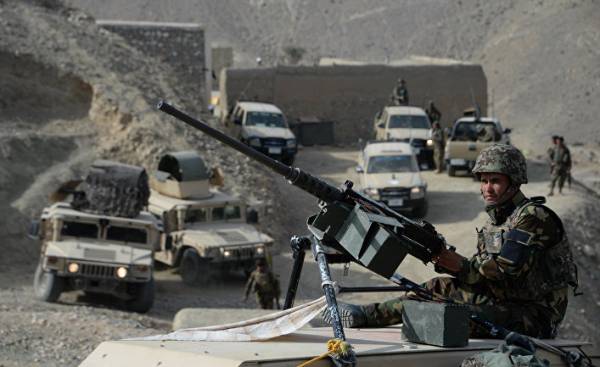
News from Afghanistan becoming more unpleasant for the United States. Torn by strife and plagued by corruption, the Afghan government, which is supported by the US, gradually losing control over the country. According to a quarterly report published by the Office of the special inspector General for Afghanistan reconstruction in early 2017, “the number of Afghan security forces decreases with rising losses and increasing the number of districts that are under the control or influence of the rebels.” The Taliban (a terrorist organization banned in Russia — approx. transl.) again. Cells of the “Islamic state” (a terrorist organization banned in Russia — approx. transl.) again come to the surface, shaking the situation in the country and threatening to “throw” the chaos beyond Afghanistan. As stated by Congress June 13, defense Minister James Mattis (James Mattis), U.S. “not winning” in Afghanistan, but the Taliban are “strengthening their positions”.
Amid the growing security problems in Afghanistan, Washington is suddenly faced with a new challenge caused by Russia’s decision again to get into the Afghan quagmire. The failures supported by the America government in Kabul and turmoil in Washington, Moscow considers a sign that the US will not in the foreseeable future to stabilize Afghanistan. Russia is trying simultaneously to protect their interests in the face of continued instability and — as part of its broader strategy to increase its role in the greater middle East by Washington. In recent months, Moscow has actively engaged in Afghanistan diplomacy, based on previously established contacts with the Taliban. Some of the senior us military assume that Moscow is supplying militants even light weapons and equipment.
The heavy burden of history
After the Soviet withdrawal from Afghanistan in 1988-1989 Moscow mostly tried to stay away from this country. She assumed that neither the Russians nor the Afghans will not be satisfied with the presence of Russia in Afghanistan after a conflict that former Soviet leader Mikhail Gorbachev called a “bleeding wound” on the body and the USSR which killed more than a million Afghans. Back in early 2010-ies of the Moscow’s attempts to cooperate with the US in the fight against Afghan drug trafficking aroused the indignant protests of the Afghan government, which was then headed by Hamid Karzai (Hamid Karzai).
In the last decade and a half Russian involvement in the Afghan conflict was, at best, indirect. It seemed that Moscow’s aims are not at variance with the objectives of the US and its partners in the International security assistance force (ISAF).
Moscow has generally supported the US attempts to stabilize Afghanistan since the US and its allies overthrew the Taliban government for refusing to extradite the perpetrators of the terrorist attacks of September 2001. Moscow has provided diplomatic support for American efforts, while strengthening their ability and that of its Central Asian allies on the organization of collective security Treaty (CSTO) to counter the spread of instability from Afghanistan into the territory of the former Soviet Union. She also resigned to the fact that Washington sent troops to Central Asia, provided support — including intelligence operations in Afghanistan and agreed to participate in the notorious Northern distribution network — an attempt to create supply routes that bypass Pakistan.
I see you going back to Afghanistan, Watson?
This year, however, Russia has assumed a much more active role in the Afghan conflict, which was associated with the deteriorating situation inside Afghanistan and the transition of the U.S. and Russia towards a more confrontational relationship. Apparently, Moscow has decided that the U.S.-led operation, ongoing since 2001, and have not stabilized Afghanistan. In her view, America — whether because of the hasty withdrawal of troops, whether because of personnel losses in the long term will not be able to guarantee stability in the country, or to support on the southern border of Central Asia the order in which Russia is interested. At the same time, Moscow’s attempts to increase its role in Afghanistan is part of a broader initiative to limit American influence in the greater middle East, also affecting the Russian policy in Syria, Central Asia, the Persian Gulf, the Levant and even North Africa.
In February, Russia held an event during which representatives of regional powers discussed the future of Afghanistan, and in April with pomp convened a peace conference in Moscow, representatives of a dozen countries (United States refused the invitation).
The most important — and, from the point of view of Washington, the most frightening aspect of the attempts of Moscow to participate in the settlement of the Afghan conflict is associated with her willingness to cooperate with the Taliban (ironically, the US also considered this possibility back in 2013, but in the end decided that it was impossible). While the U.S. continues to support the government of President Ashraf Gani (Ashraf Ghani), seeking to achieve a military victory over the Taliban, Moscow is stepping up diplomatic contacts with the Taliban. According to rumors, she even agreed to provide him with weapons and financial support. Russians themselves rejected the allegations, repeated from many high-ranking American officials, and claim that they just want to connect the Taliban to peace talks. However, Russia prevents U.S. attempts to reconcile the government Ghani with some of the warring factions with him that would allow him to concentrate on countering the Taliban.
The Fears Of Moscow
If Russia really decided to directly support the Taliban, this decision is a combination of practical reasons and extend far beyond Afghanistan’s geopolitical plans.
Since the US invasion, Russia has adopted a somewhat contradictory approach to the conflict in Afghanistan. Supporting the invasion itself, allowing US to carry out the supply of troops through Russian territory and accepting the deployment of us troops in Uzbekistan and Kyrgyzstan, Moscow from the very beginning made it clear that it opposes a permanent US military presence in the depths of Eurasia. While Moscow has long feared that the United States can withdraw from Afghanistan without achieving peace in the country, and that remained after their departure, the instability will pose a threat to Russian allies in Central Asia and ultimately Russia itself.
Although the fear that extremism “will perelistnut” across the country’s borders, sometimes exaggerated for political reasons (as in Moscow and Central Asian capitals), it is not illusory. A special concern is the production of opiates in Afghanistan and the Afghan drug trafficking. According to the UN office on drugs and crime (UNODC), Russia is among the world leaders in the abuse of opiates, overdoses and the number related to drug use HIV infections. Meanwhile, according to the UNODC, due to the ongoing reduction of power of the Afghan government, opium production in Afghanistan increased in 2016 by 43%. Russia has long argued that the American approach to the production of opium in Afghanistan, focusing on the suppression, not eradication, is flawed. In February 2016, she withdrew from the agreement on anti-drug cooperation with the United States in connection with the General deterioration of relations between the two countries.
Moscow also fears the spread from Afghanistan, extremism and terrorism. In the late 1990-ies and early 2000-ies the Taliban provided asylum to a number of militant groups — from “al-Qaeda” (the terrorist organization banned in Russia — approx. transl.) to the “Islamic movement of Uzbekistan” (a terrorist organization banned in Russia — approx. transl.), carried out terrorist attacks across Central Asia and organized in 1999 and 2000 incursions into Kyrgyzstan. In recent years, a considerable number of Central Asian jihadists sent to Syria to fight. On the background of the crumbling Afghan security the prospect of returning to the country of many battle-hardened in the battles of Central Asian militants are seriously worried about Moscow. Equally dangerous is the emergence in Afghanistan of ISIS cells who are not only from returning from Syria militants, but also of those who radicalized closer to their native places.
The enemy of my enemy… may be useful
Thus, betting on the Taliban, Russia apparently believes that the Taliban, unlike ISIS and of the figures involved through participation in the Syrian conflict to the global jihadist network, is more interested in control over Afghanistan than exporting Jihad to other countries. As underlined by the special representative of the Russian President for Afghanistan Zamir Kabulov, in his extensive interview to the Turkish press in December 2016, “most of the Taliban are now — as a result they received in Afghanistan and the historic lessons — local force and rejected the idea of global jihadism”.
Sensing that the position of the government of Ghani is deteriorating and that the US should not expect that Moscow hopes that the Taliban will intensify enough to become a counterweight to ISIL and to install in Afghanistan a semblance of stability — along with Ghani, or by coming to replace him.
Of course, the willingness to oppose ISIS is not the only positive feature of “Taliban” from the point of view of Moscow. Ever since the US invaded in 2001 in Afghanistan to overthrow the Taliban, refused to extradite to America Osama bin Laden, the Taliban fought against the presence of American forces. Meanwhile, although at some point the Russians have tempered their concerns about U.S. troops in Afghanistan, considering that Washington is interested in stability and able to provide, now they seem to believe the us presence is more of a threat than a benefit. In his interview with Turkish journalists Kabulov noted that after the 1979 revolution that expelled the United States from Iran, the Americans are looking for military foothold in Eurasia. Afghanistan “seemed the easy option as it is located close to Russia, Central Asia, China, Iran and Pakistan,” he added.
Such a prospect has long worried Moscow, which fears that the US wants to contain Russian power, “zakuporit” Russia in its region. At the same time Moscow believes that US influence in the middle East is falling and that Russian have the opportunity to fill the resulting power vacuum. The Taliban in power, whether in victory or as a result of a peace agreement that will give the Taliban seats in the government, guarantees Russia from a long-term presence of Americans in Afghanistan and will give Moscow more influence on the government in Kabul.
Attempts to reduce US influence in Afghanistan is quite consistent with the operations in Syria, where Moscow backs President Bashar al-Assad (including in order to keep their base in the Eastern Mediterranean)- and its activities in Egypt, Saudi Arabia, Pakistan and even Israel. Moscow willingly establishes new partnerships across the greater Middle East to curb the power of the United States and guarantee yourself the opportunity to influence what is happening in the field of security on its borders.
Cost Washington to think that Afghanistan is worse already can not be like Moscow once again reminded America that she is perfectly able to refute the well-established opinion and throw new challenges. However, as Moscow felt on my own experience during my last Afghan adventure (and that she realizes now in Syria), to get involved in the mess is always easier than to get out.
Jeffrey Mankoff, Deputy Director and senior fellow of the program “Russia and Eurasia” Foundation for strategic and international studies.







